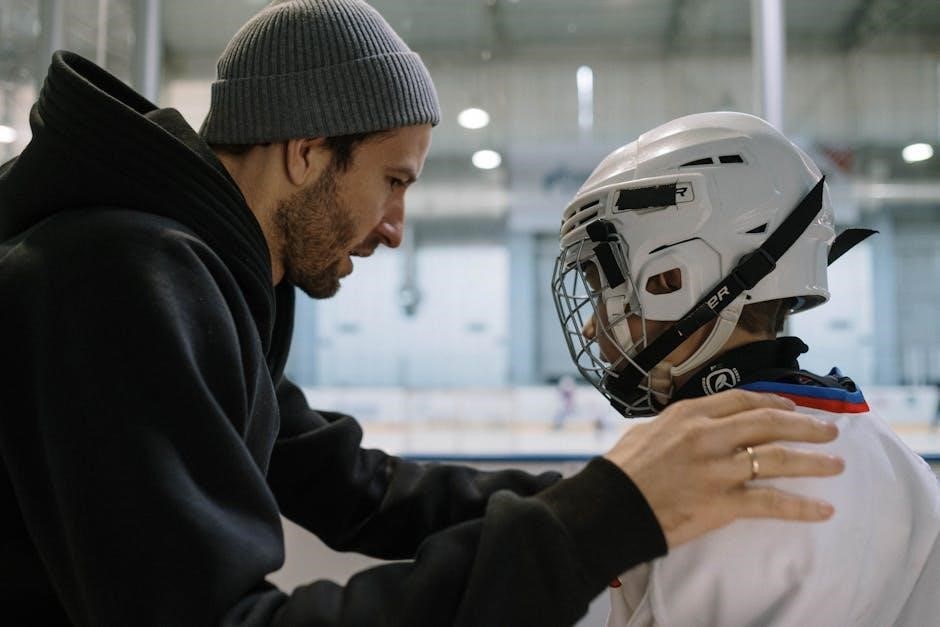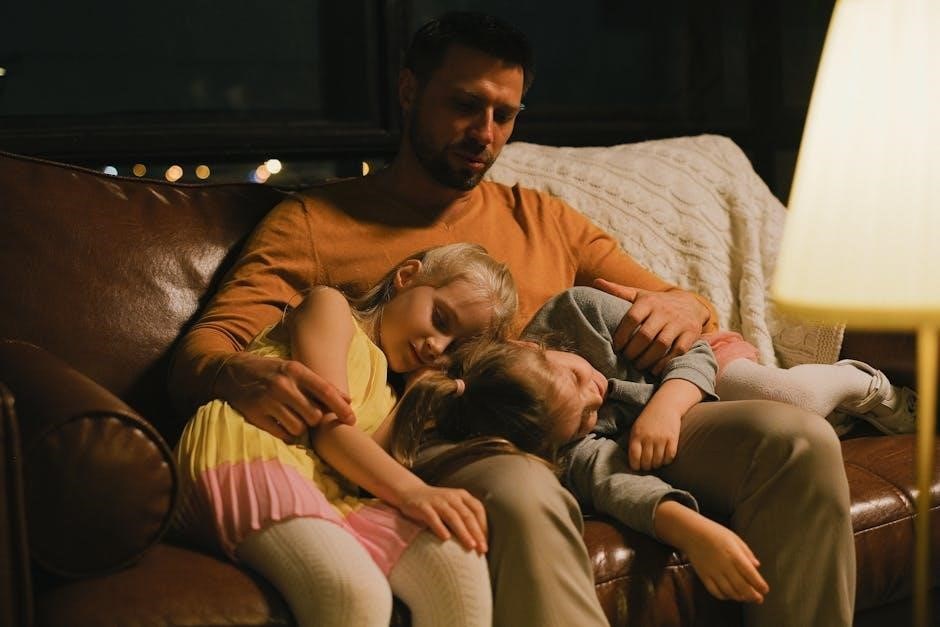This guide helps parents evaluate the suitability of the film Coach Carter for their children, focusing on its themes, content, and real-life inspiration.
Overview of the Movie and Its Themes
Coach Carter is a 2005 biographical sports drama directed by Thomas Carter, starring Samuel L. Jackson. Based on the true story of Ken Carter, it follows a high school basketball coach who benches his undefeated team for poor academic performance. The film emphasizes themes of discipline, responsibility, and the importance of education. Rated PG-13 for violence, sexual content, language, teen partying, and drug material, it provides a powerful message about accountability and academic excellence, making it a valuable resource for parents assessing its suitability for their children.

Understanding the PG-13 Rating
Coach Carter is rated PG-13 for violence, sexual content, language, teen partying, and some drug material, ensuring parental guidance is recommended for younger viewers.
Violence and Gore in the Film
The film contains mild violence, including confrontations and altercations, but no excessive gore. While these scenes are not overly graphic, they may still be unsettling for younger audiences. Parents should be aware of these moments, as they reflect the challenges and conflicts faced by the characters. The violence is mostly emotional and situational, emphasizing the struggles of the players rather than glorifying aggression. This aspect of the movie aligns with its overall themes of discipline and personal growth, but parental discretion is advised for sensitive children.
Sexual Content and Nudity
The film contains mild sexual content, including scenes of teen partying and suggestive cheerleading outfits. A pool scene shows young women in bras and panties, with men in boxers, though nothing explicit is shown. There are also discussions about an out-of-wedlock teen pregnancy and abortion, adding mature themes. While not overly explicit, these elements warrant parental awareness. The content is handled responsibly but may require guidance for younger viewers to understand the implications and consequences of such situations. Parents should review these scenes to decide if they are appropriate for their child;
Profanity and Language
Coach Carter includes moderate profanity, with frequent use of strong language, particularly the n-word, despite Coach Carter’s efforts to address its offensiveness. This may concern parents, as the film contains over 80 instances of obscene words. While the context often serves to highlight the characters’ growth, the prevalence of such language warrants caution. Parents should be mindful of this content when deciding whether the film is suitable for their child, especially younger or more sensitive viewers. The language reflects the realism of the characters’ environment but may require discussion post-viewing.
Alcohol, Drugs, and Smoking
The film includes scenes depicting teen partying with alcohol and drug references, contributing to its PG-13 rating. While not overly graphic, these moments may concern parents. Smoking is also briefly shown, reflecting the characters’ environments. Coach Carter addresses such behaviors, promoting accountability and better choices. However, the presence of these elements should be considered when assessing suitability for younger viewers. Parents may want to discuss the consequences of substance use depicted in the film to provide context and guidance for their children.

Academic Expectations and Life Lessons
Coach Carter’s contract required a 2.3 GPA, class attendance, and community service, emphasizing education and personal growth over basketball success, teaching life-changing lessons.
Coach Carter’s Contract with Players
Coach Carter implemented a strict contract requiring players to maintain a 2.3 GPA, attend all classes, wear suits on game days, and perform community service. This contract aimed to prioritize education and accountability over athletic success. Players were expected to demonstrate respect and responsibility both on and off the court. Failure to comply resulted in suspension, teaching them that their actions had consequences and fostering a sense of personal responsibility and growth.
The Importance of Education and Discipline
Coach Carter emphasizes the transformative power of education and discipline. The film highlights how Coach Carter’s strict approach, including mandatory study sessions and academic requirements, helped his players recognize the value of hard work and personal accountability. By prioritizing education over sports, he instilled discipline that extended beyond the basketball court, teaching life lessons about responsibility and the importance of academic achievement. This focus on education and character-building is central to the film’s message.

Parental Concerns and Mature Themes
Coach Carter addresses mature themes like teen pregnancy, abortion discussions, and racial language, raising concerns for parents due to its PG-13 rating and complex content.
Teen Pregnancy and Abortion Discussions
The film tackles sensitive topics such as teen pregnancy and abortion, presenting these issues in a realistic and thought-provoking manner. These scenes are handled with care, aiming to spark meaningful conversations about responsibility and life choices. Parents should be prepared to discuss these mature themes with their children, ensuring they understand the emotional and societal implications. The inclusion of these topics aligns with the film’s broader message of accountability and personal growth, making it a valuable tool for opening dialogue about real-life challenges.
Racial Language and Its Impact
The film addresses racial language, highlighting its offensive nature and negative consequences. Coach Carter emphasizes respect and unity, discouraging the use of derogatory terms; While such language appears in the movie, it serves to underscore the importance of empathy and understanding. Parents should use this as an opportunity to discuss the historical and societal impacts of racial slurs, fostering open conversations about equality and respect in their households and communities. This theme reinforces the film’s message of personal responsibility and social awareness.

Real-Life Inspiration and Impact
Coach Carter is inspired by the true story of Ken Carter, a high school coach who prioritized education over sports, sparking national debate and admiration.
The True Story of Ken Carter
Ken Carter, a high school basketball coach, gained fame in 1999 for benching his undefeated team due to poor academic performance. His strict academic expectations, including a 2.3 GPA requirement, community service, and a dress code, initially caused resistance but ultimately led to personal growth for his players. Carter’s approach emphasized education over athletics, inspiring both praise and criticism. His story highlights the importance of discipline and accountability, making him a controversial yet respected figure in education and sports.
Reactions from Parents and the Community
Ken Carter’s unconventional methods sparked intense reactions. Many parents and community members initially opposed his strict academic requirements, viewing them as excessive. However, as the team’s behavior and academic performance improved, attitudes shifted; Some praised Carter’s commitment to education and discipline, while others criticized his hardline approach. The community remained divided, but the team’s eventual success and personal growth demonstrated the positive impact of Carter’s leadership, earning him both admiration and respect despite initial resistance.

Positive Messages and Takeaways
Coach Carter emphasizes personal responsibility, the value of education, and overcoming adversity. It inspires self-improvement and highlights the triumph of the human spirit through perseverance.
Personal Responsibility and Growth
In Coach Carter, the players learn to take accountability for their actions, both on and off the court. By requiring academic excellence and respect, Coach Carter teaches them that success involves hard work and dedication. Through their journey, the team transforms from undisciplined individuals into responsible young men, understanding that their choices have consequences. This emphasis on personal growth highlights the importance of setting high standards and striving for self-improvement, making the film a powerful tool for discussing responsibility with teens.
The Triumph of the Human Spirit
Coach Carter showcases the resilience and determination of both the coach and his players; Despite facing opposition from the community and personal setbacks, they persevere and achieve remarkable growth. The film illustrates how commitment to a cause and belief in one’s potential can lead to transformative change. This uplifting message encourages viewers to embrace challenges and strive for excellence, highlighting the power of the human spirit to overcome adversity and achieve greatness through perseverance and dedication.
Coach Carter offers a powerful blend of inspiration and realism, making it a valuable tool for sparking conversations about responsibility, education, and personal growth in teens.
Is “Coach Carter” Suitable for Your Child?
Coach Carter is rated PG-13 for violence, sexual content, language, and teen partying. While its themes of discipline and education are positive, parents should consider their child’s sensitivity to mature topics like teen pregnancy and strong language. The film’s messages about personal responsibility and growth are uplifting, but younger or more impressionable viewers may require guidance; Ultimately, it’s a valuable watch for teens who can grasp its deeper lessons about accountability and success.
Guiding Your Teenager Through the Film’s Themes
Parents should encourage open conversations about Coach Carter’s themes, such as discipline, education, and personal responsibility. Discuss the consequences of actions and the importance of perseverance. Address mature topics like teen pregnancy and profanity, ensuring your child understands the gravity of these issues. Use the film as a tool to reinforce positive values and life lessons, fostering a deeper understanding of accountability and the rewards of hard work. This guidance will help your teenager grasp the film’s meaningful messages.
